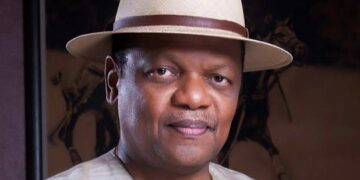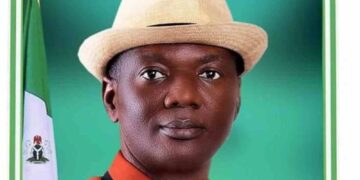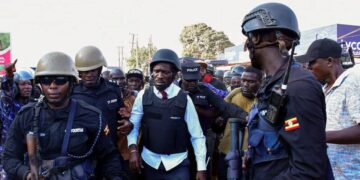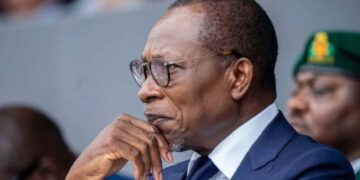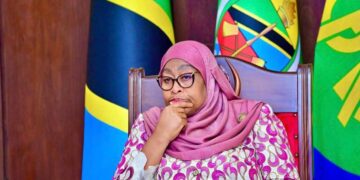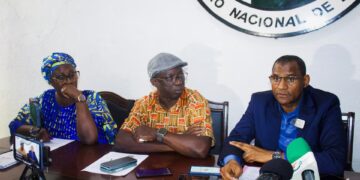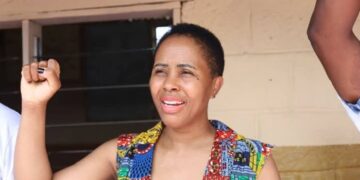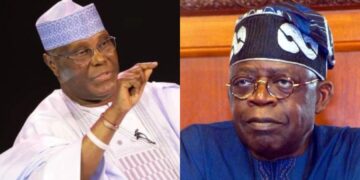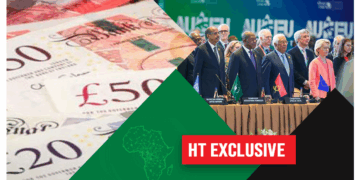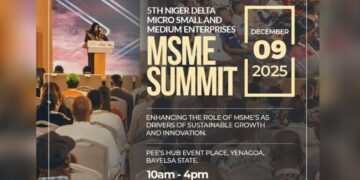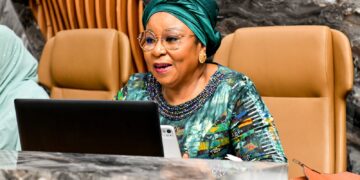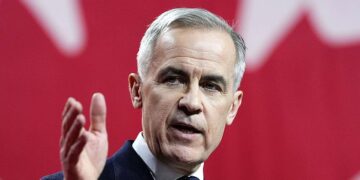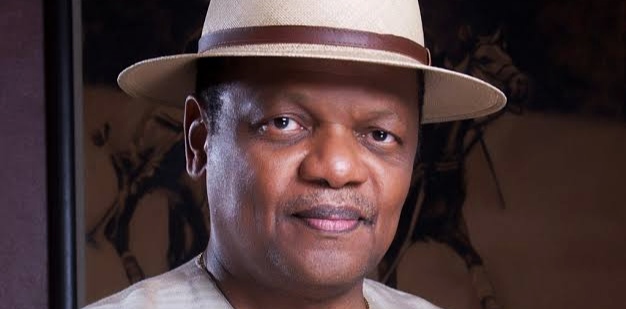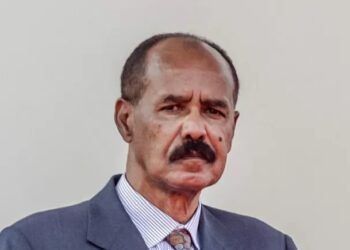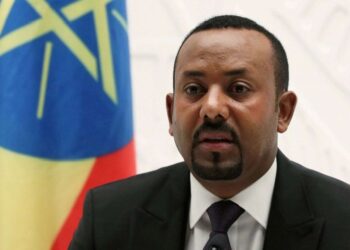By Raheem Akingbolu
The subtle effort of boardroom guru, Mr. Atedo Peterside and his GoNigeria, an offshoot of Anap Foundation, to galvanize the 60 percent youth population in Nigeria, towards political participation, appears to be yielding result, considering the feedbacks and the social media followership the campaign enjoys daily. Raheem Akingbolu reports.
The quote from the notable seventh Secretary-General of the United Nations, Kofi Atta Annan, shows the pivotal roles of youths in any democracy. He stated “No one is born a good citizen; no nation is born a democracy. Rather, both are processes that continue to evolve over a lifetime. Young people must be included from birth. A society that cuts itself off from its youth severs its lifeline; it is condemned to bleed to death.”
The statement implies that no nation can do without its youthful citizens and should be included in their democratic system, as future leaders, with its larger percentage of the global population. It also shows that youths should endeavour to participate in electoral processes. This young generation according to the United Nations (UN), are people between the ages of 15 and 24. It also took into cognizance, the fact that member states and other entities use different definitions, with ages from 15 to 35 years, as applied by the African Youth Charter of the African Union in 2006.
Today, there are 1.2 billion young people aged 15 to 24 years, accounting for 16 percent of the global population, and a look at the African scene shows that in 2020, the continent’s population under age 35 represents almost a billion people (540.8 million 0-14 years and 454.5 million of young people between ages 15-34), amounting to 22.7 percent of the world’s total youth population, the second largest after Asia’s 58 percent.
In Nigeria, Africa’s largest economy with over 214 million people, the youth demographic forms over 60 percent of her population and has made their voices heard through various platforms.
While youths globally are often involved in informal, politically relevant processes, such as activism or civic engagement, they are not formally represented in national political institutions such as parliaments and many of them do not participate in elections, and this has impacted the quality of democratic governance which is not favourable to them.
The scenario has brought to the fore the United Nations Development Programme (UNDP) report in 2013 which shows that globally, youths are not at the centre of political decision making, though almost half the world’s population is under 30 years old; that less than six percent of the parliamentarians are under 35 years old, while less than two percent are under 30 years of age.
It also contained that only 1.65 percent of legislators around the world are in their 20s and for a third of countries, eligibility for national parliament starts at 25 years old. Furthermore, it was subsequently disclosed that voters’ turnout among 18-25 years continues to be lower than other age-groups while two out of three countries do not consult young people as a part of the process of preparing poverty reduction strategies or national development plans, which makes it critical for youths to be involved in the electoral processes of their countries for proper inclusion in decision-making.
Truly, for a political system to be representative, all parts of society must be included. When young people are disenfranchised or disengaged from political processes, a significant portion of the population has little or no voice or influence in decisions that affect them.
To make a difference in the longer term, the youths must be engaged in formal political processes and have a say in formulating today’s and tomorrow’s politics. Inclusive political participation is not only a fundamental political and democratic right but also is crucial to building stable and peaceful societies and developing policies that respond to the specific needs of younger generations. This can lead to the avoidance of ugly scenarios like the EndSARS debacle, a protest by young Nigerians against police brutality that rocked the nation in October 2020.
However, in new and emerging democracies, youths’ participation in electoral processes, which ensures getting their Personal Voters’ Cards [PVC] in preparation for voting during elections, for forward-thinking candidates that would incorporate their interests is vital, for a desired and deserved country.
This formed the basis of the enlightenment campaign themed, GoNigeria, a campaign to sensitize Nigerian youths to participate in the electoral process leading to the election of visionary leaders come 2023 initiated by Anap Foundation, a non-profit organisation committed to promoting good governance. Anap Foundation will be partnering with the Independent Electoral Commission (INEC), select advocates numbering 18, celebrity ambassadors, corporate bodies as well as volunteers in ensuring that success is attained, in the move towards encouraging the youths in understanding that their votes count in having passionate leaders at the country’s helm of affairs.
The initiative is aimed at admonishing eligible Nigerians from 18 years and above to register with INEC, against the backdrop of the plea by the Commission that all eligible voters in the country should get registered by the end of June 2022. The campaign is in full gear with the initial partners of Anap Foundation, who have intensified efforts at encouraging young Nigerians to register and collect their PVC to vote in next year’s general elections towards ensuring good governance and accessing the true dividends of democracy.
It was against this backdrop that the President and Founder of Anap Foundation, Mr. Atedo Peterside stated that GoNigeria is the surest way of encouraging Nigerian youths which forms a higher percentage of the voting public to be involved in the nation’s elections scheduled for 2023, according to INEC’s statistical data that over 1.2 million out of the 1,731,618 Nigerians that have completed their registration in November 2021 are young people between the ages of 18 and 34.
He said a situation whereby the youths do not show interest in the country’s electoral process would mean selling their birthrights to politicians, whose policies may not reflect the collective objective of the populace, especially the young Nigerians who have broader views of the society.
Peterside affirmed that the most popular reason which educated youths give for opting out of elections is that their votes will not count and the candidates are uninspiring, but he hinged his advocacy on the words of the famous Socrates which states “One of the penalties for refusing to participate in politics is that you end up being governed by your inferiors”.
The erudite entrepreneur, investment banker, and economist, who is the Founder and Pioneer Chief Executive Officer of Stanbic IBTC Bank Plc, also urged Nigerian youths to shun all sorts of violence and killings in different parts of the country and encourages participation in the 2023 elections.
He said the numerous killings of innocent citizens in the country is not the solution to youths’ aggressiveness for a better Nigeria, that such should be channeled to the 2023 elections by voting for credible candidates of their choice that would make the country a better place for all.
With notable quotes by the late Herbert Hoover, America’s 31st President which states “Older men declare war, but it is the youth that must fight and die;” Niko Bellic, the protagonist of Grand Theft Auto IV, that “War is when the young and stupid are tricked by the old and bitter into killing each other;” and Bertrand Russel, the British Philosopher, and Logician, that “War does not determine who is right, but who is left,” Peterside advised the youths for a rethink of their stance on aggrieved issues by voting for trustworthy leaders that can make their dreams come to fruition.
Interestingly, the GoNigeria campaign advocates have also intensified persuasive efforts at advocating youths’ involvement in Nigeria’s elections for inclusion in governance.
In line with that, a GoNigeria advocate, Dr. Salamatu Hussaini Suleiman, Former Minister, Women Affairs and Social Development, and ECOWAS Commissioner for Political Affairs, Peace and Security, posits “Nigerian Youths, all united, with a common goal can change the future of this country. But first, register, collect your PVC, and vote.”
Another, Mr. Osita Chidoka, a former Minister of Aviation, enthused “the future you want cannot come from sitting at home on Election Day.”
Also, Mohammed Ali Pate, a Professor of Public Health Leadership at Harvard, and Former Minister and Former World Bank Global Director for Health, avowed “Widespread poverty, insecurity, and youth unemployment are direct results of the political system Nigeria operates to elect its leaders. If you want to change the results, you must participate in the elections. Otherwise, your decision not to participate is a decision for continuing a failed political system.”
Consequently, Aisha Yesufu, an Active Nigerian citizen, affirmed, “Votes don’t count is the big lie politicians sell to those whose votes cannot be bought so that only those whose votes can be bought will come to the polling units.”
According to Dike Chukwumerije, a renowned poet “If you stay out of politics, those who stay in politics will not stay out of your life, your health, your education, your home, your business, or your bank account.’’
Consequently, Ibrahim Dahiru Waziri, former DMD NLNG/CEO of NNPC, and former House of Representative Member, stated “in politics, you are only as important as the votes you can cast, go get registered and let your vote count.”
Expressing his views, Folarin Falana [Faiz], a Musician, Actor, and Entertainer, stated “Failure to participate in the political process is the reason we have been cursed with leadership by the worst of us.”
Indeed, the buzz on social media in the past couple of weeks, with the publication on the enlightenment campaign, would to a large extent, encourage youths to toe the line of GoNigeria by getting their PVC before INEC’s June 30, 2022 deadline, in preparation for the 2023 elections.
In the light of this, analysts believe that to truly get the youths registered, social interactive events in areas that connect to the youth like movies, music, and entertainment, among others, would have been an attraction. For example, a recent event in Lagos, Nigeria’s commercial hub, where a concert was staged and PVC was the only means of admission, was a pointer to the fact that entertainment is a magnet to the youths in getting them connected to the good cause which the GoNigeria projects seek to achieve.
The result of the events shows that it was poorly organized and this avenue can be exploited by Anap Foundation through the GoNigeria concept to properly capture the minds of these young Nigerians to change their political disposition and make them highly inclined towards active participation in the country’s electoral process, especially in the forthcoming 2023 elections.
For example, having a youth event with a popular superstar like Davido, with huge followers on social media and millions of fans with their PVC as admission, would resonate with the GoNigeria objective of getting this demographic of Nigerians involved in the country’s political process. It will also spur the interest of others to register and collect their voter’s cards for next year’s election.
However, the positive steps taken by Anap Foundation are quite commendable, being a private sector initiative, complementing government effort in having a larger percentage of the populace involved in the political system, especially the youths, who are the future leaders of tomorrow.
